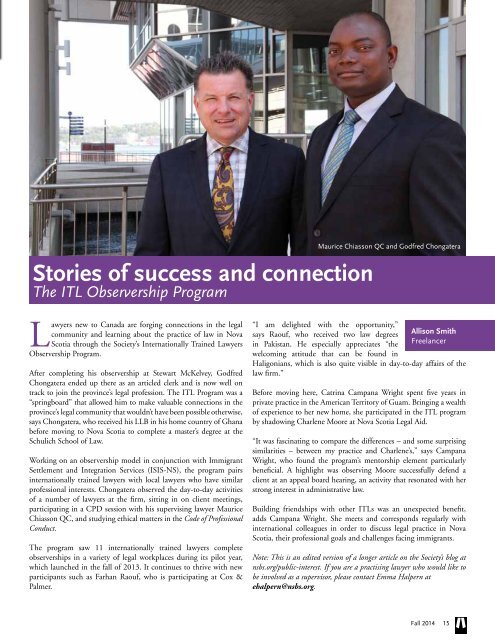11eApYW
11eApYW
11eApYW
You also want an ePaper? Increase the reach of your titles
YUMPU automatically turns print PDFs into web optimized ePapers that Google loves.
Stories of success and connection<br />
The ITL Observership Program<br />
Maurice Chiasson QC and Godfred Chongatera<br />
Lawyers new to Canada are forging connections in the legal<br />
community and learning about the practice of law in Nova<br />
Scotia through the Society’s Internationally Trained Lawyers<br />
Observership Program.<br />
After completing his observership at Stewart McKelvey, Godfred<br />
Chongatera ended up there as an articled clerk and is now well on<br />
track to join the province’s legal profession. The ITL Program was a<br />
“springboard” that allowed him to make valuable connections in the<br />
province’s legal community that wouldn’t have been possible otherwise,<br />
says Chongatera, who received his LLB in his home country of Ghana<br />
before moving to Nova Scotia to complete a master’s degree at the<br />
Schulich School of Law.<br />
Working on an observership model in conjunction with Immigrant<br />
Settlement and Integration Services (ISIS-NS), the program pairs<br />
internationally trained lawyers with local lawyers who have similar<br />
professional interests. Chongatera observed the day-to-day activities<br />
of a number of lawyers at the firm, sitting in on client meetings,<br />
participating in a CPD session with his supervising lawyer Maurice<br />
Chiasson QC, and studying ethical matters in the Code of Professional<br />
Conduct.<br />
The program saw 11 internationally trained lawyers complete<br />
observerships in a variety of legal workplaces during its pilot year,<br />
which launched in the fall of 2013. It continues to thrive with new<br />
participants such as Farhan Raouf, who is participating at Cox &<br />
Palmer.<br />
“I am delighted with the opportunity,”<br />
says Raouf, who received two law degrees<br />
in Pakistan. He especially appreciates “the<br />
welcoming attitude that can be found in<br />
Allison Smith<br />
Freelancer<br />
Haligonians, which is also quite visible in day-to-day affairs of the<br />
law firm.”<br />
Before moving here, Catrina Campana Wright spent five years in<br />
private practice in the American Territory of Guam. Bringing a wealth<br />
of experience to her new home, she participated in the ITL program<br />
by shadowing Charlene Moore at Nova Scotia Legal Aid.<br />
“It was fascinating to compare the differences – and some surprising<br />
similarities – between my practice and Charlene’s,” says Campana<br />
Wright, who found the program’s mentorship element particularly<br />
beneficial. A highlight was observing Moore successfully defend a<br />
client at an appeal board hearing, an activity that resonated with her<br />
strong interest in administrative law.<br />
Building friendships with other ITLs was an unexpected benefit,<br />
adds Campana Wright. She meets and corresponds regularly with<br />
international colleagues in order to discuss legal practice in Nova<br />
Scotia, their professional goals and challenges facing immigrants.<br />
Note: This is an edited version of a longer article on the Society’s blog at<br />
nsbs.org/public-interest. If you are a practising lawyer who would like to<br />
be involved as a supervisor, please contact Emma Halpern at<br />
ehalpern@nsbs.org.<br />
Fall 2014 15


